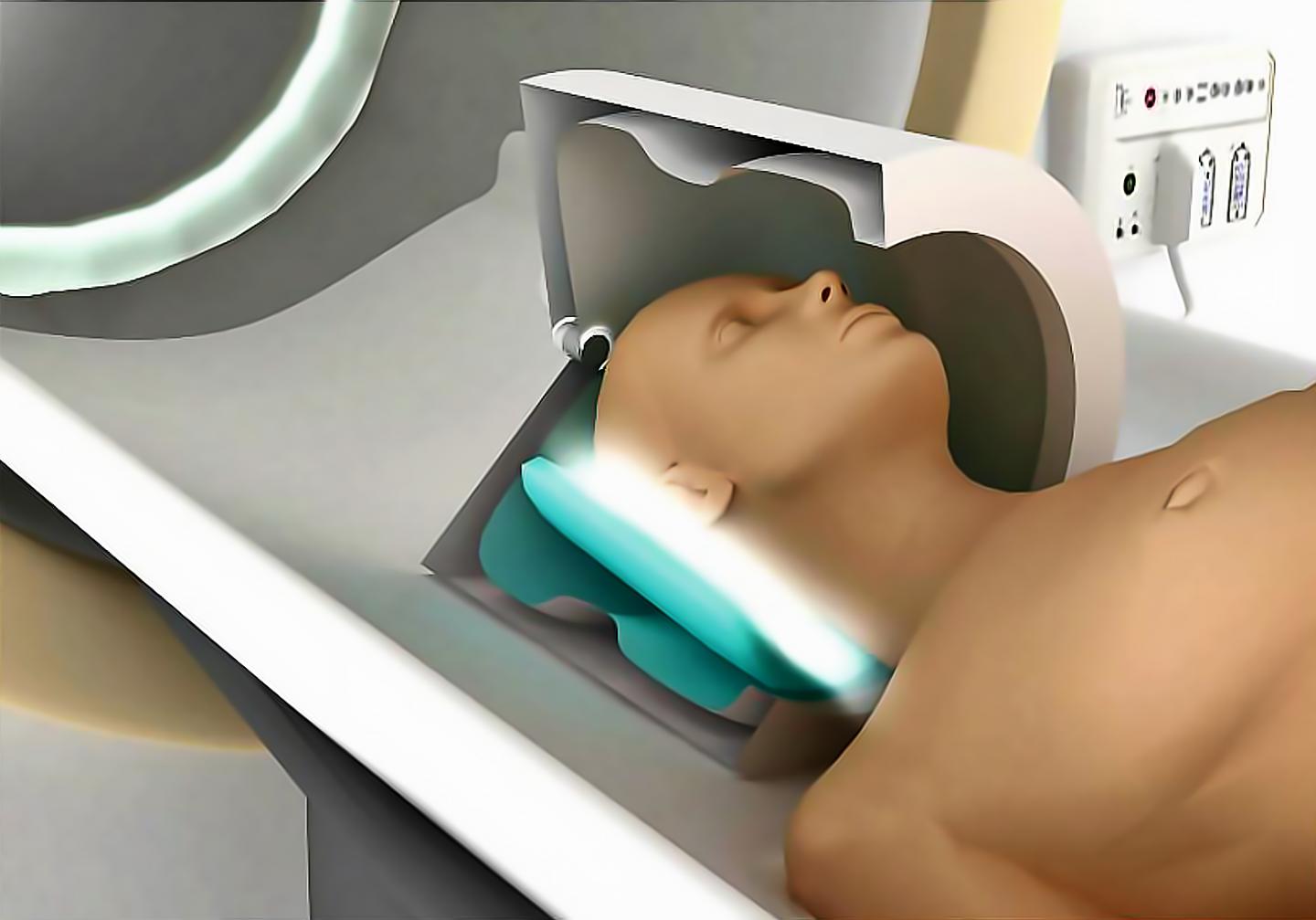
Credit: © ITMO University
Scientists from the Netherlands and Russia designed and tested a new metasurface-based technology for enhancing the local sensitivity of MRI scanners on humans for the first time. The metasurface consists of thin resonant strips arranged periodically. Placed under a patient's head, it provided much higher signals from the local brain region. The results published in Scientific Reports, show that the use of metasurfaces can potentially reduce image acquisition time, thus improving comfort for patients, or acquire higher resolution images for better disease diagnosis.
Magnetic resonance imaging (MRI) is a widely used medical technique for examination of internal organs, which can provide, for example, information on structural and functional damage in neurological, cardiovascular, in musculoskeletal conditions, as well as playing a major role in oncology. However, due to its intrinsically lower signal-to-noise ratio, an MRI scan takes much longer to acquire than a computed tomography or ultrasound scan. This means that a patient must lie motionless within a confined apparatus for up to an hour, resulting in significant patient discomfort, and relatively long lines in hospitals.
Specialists from Leiden University Medical Center in the Netherlands and ITMO University in Russia for the first time have acquired human MR-images with enhanced local sensitivity provided by a thin metasurface – a periodic structure of conducting copper strips. The researchers attached these elements to a thin flexible substrate and integrate them with close-fitting receive coil arrays inside the MRI scanner.
"We placed such a metasurface under the patient's head, after that the local sensitivity increased by 50%. This allowed us to obtain higher image and spectroscopic signals from the occipital cortex. Such devices could potentially reduce the duration of MRI studies and improve its comfort for subjects", says Rita Schmidt, the first author of the paper and researcher at the Department of Radiology of Leiden University Medical Center.
The metasurface, placed between a patient and the receive coils, enhances the signal-to-noise ratio in the region of interest. "This ratio limits the MRI sensitivity and duration of the procedure", notes Alexey Slobozhanyuk, research fellow at the Department of Nanophotonics and Metamaterials of ITMO University. "Often the scans must be repeated many times and the signals added together. Using this metasurface reduces this requirement. Conventionally, if now an examination takes twenty minutes, it may only need ten in the future. If today hospitals serve ten patients a day, they will be able to serve twenty with our development."
Alternatively, according to the scientists, the metasurface could be used to increase the image resolution. "The size of voxels, or 3D-pixels, is also limited by the signal-to-noise ratio. Instead of accelerating the procedure, we can adopt an alternative approach and acquire more detailed images", says Andrew Webb, the leader of the project, professor of Radiology at Leiden University Medical Center.
Until now, no one has shown integration of metamaterials into close-fitting receive arrays because their dimensions were much too large. The novel ultra-thin design of the metasurface helped to solve this issue.
"Our technology can be applied for producing metamaterial-inspired ultra-thin devices for many different types of MRI scans, but in each case, one should firstly carry out a series of computer simulations as we have done in this work. One needs to make sure that the metasurface is appropriately coupled", concludes Rita Schmidt.
###
Reference:
Rita Schmidt, Alexey Slobozhanyuk, Pavel Belov and Andrew Webb (2017), Flexible and compact hybrid metasurfaces for enhanced ultra high field in vivo magnetic resonance imaging, Scientific Reports, https://www.nature.com/articles/s41598-017-01932-9
ITMO University (Saint Petersburg) is a national research university, the leading Russian university in the field of information and photonic technologies. The university is the alma mater of winners of numerous international programming competitions: ACM ICPC (the only six-time world champions), Google Code Jam, Facebook Hacker Cup, Yandex Algorithm, Russian Code Cup, Topcoder Open etc. Priority research areas: IT, photonic technologies, robotics, quantum communication, translational medicine, urban studies, art&science, and science communication. Starting from 2013, the university has been a member of Project 5-100, which unites top Russian universities to improve their status in the international research and education arena. In 2016 ITMO University became 56th among the world's top universities in Computer Science, according to the Times Higher Education ranking, and scored 3rd among Russian universities in the overall THE ranking.
Media Contact
Dmitry Malkov
[email protected]
7-953-377-5508
@spbifmo_en
http://en.ifmo.ru/
############
Story Source: Materials provided by Scienmag





